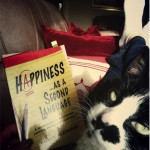I recently bought a friend’s first novel. It was so exciting, launching my Kindle Reader and clicking on the cover in my ebook library, then boom – there I was, on the first page of Chapter One, thrust right into the first line of her smart, funny story.
Except when I start a new book, I don’t want to skip straight to the first page of the story. I want to linger on the cover for a moment, contemplating the choices that the author, artist and publisher have made in using this image to convey what the book is about. I can swipe past the copyright page and legalese and other “front matter,” but then I like to peruse the Table of Contents for a while. I want to know how many chapters there are, how long each one is, even some of the titles (but only the first few, lest they give anything away). This is especially important when I’m not holding an actual book, so have no other indication of how long it is.
If there are dedications, I want to read them. I want to get a better sense of this author and who in the world is important to her. She and I are about to enter into the intimate relationship of storyteller and audience – why would I ever attempt to get this close without bothering to take in all that she wants to tell me?
And yet, Amazon has decided that all of that is not important. It’s all the fluff that can be skipped on the way to the start of the story. In fact, they’ve decided that as a reader, I’m so lazy or incompetent, or I have such a short attention span, that they are going to go ahead and skip it all for me. I’m not sure who in the corporate offices up there in Seattle made that decision when they began programming ebooks for the Kindle, but as both a reader and an author, I’d like to explain why this is such a mistake.
Reading a book is not some utilitarian function that one just has to get through to move on to the next task, like washing the dishes or taking out the trash.  Reading is a gift of time spent on ourselves, and I am assuming that most readers are like me (a grand assumption, I know, but tell me if you’d disagree): we do it for pleasure. Reading a book has a certain ritual to it. We all develop our own ways of approaching new books that maximize the joy we will get out of them. I don’t want Jeff Bezos or anyone else telling me that my way of reading is wrong, and I sure don’t want Amazon making that decision for me.
Reading is a gift of time spent on ourselves, and I am assuming that most readers are like me (a grand assumption, I know, but tell me if you’d disagree): we do it for pleasure. Reading a book has a certain ritual to it. We all develop our own ways of approaching new books that maximize the joy we will get out of them. I don’t want Jeff Bezos or anyone else telling me that my way of reading is wrong, and I sure don’t want Amazon making that decision for me.
Amazon banked on the fact that a good portion of us would fall in love with ebooks. That we would overcome our need for the tactile pleasure of turning a page in exchange for the convenience of carrying 1,000 books with us at all times on a device that weighs about the same as your average dime-store novel and takes up less space. But if they ever want me to curl up on couch to savor my ebook, they can’t treat it like some homework assignment where they “help” by taking me straight to what they think matters. Amazon doesn’t ship print books with the first eight pages glued together, so why do that with an ebook?
Worse, for some books, valuable content is lost in this process. The books I write are nonfiction, and there is crucial information in a short introduction in front of the Table of Contents that I now realize some readers miss. I know this because I recently dropped in on a conversation on a discussion board about one of my books that went like this:
Reader #1: It was a quick read, and there were some good parts, but it’s not going to change anyone’s life.
Reader #2: I’m sorry, but you are wrong. It’s changing mine. Plus, if you think it’s a quick read, you are reading it wrong. The author even tells you that.
Reader #1: What are you talking about?
Reader #2: Right in the beginning, she says it’s not a quick read, and to take your time and do all the exercises and try all the techniques. She actually says it doesn’t work if you rush through it.
Reader #1: There wasn’t anything like that in mine.
For authors, Internet etiquette demands staying out of conversations like this, and I was thrilled that at least one reader explained what might have been the problem, but it is so frustrating that this particular problem even existed, since it was caused by Amazon and it did not need to be. The section that Reader #1 missed is right there, right before the page that Amazon has decided my ebook should open on. It is a loss for both her and me that she never saw it.
Front matter in books may include all sorts of information that readers probably want: other books in the series, dedications and acknowledgements, suggested additional reading, and for self-help books, perhaps ways to approach the material to get the most out of it.
At least give us the choice, we authors and readers. Give me the option as an author of choosing what page I want readers of my ebooks to start on. For me, it would be the cover, but for others it may be a dedication page or an introduction. Then give readers the choice of starting on the author’s chosen page, the Amazon default start page, or the cover. Or, simply start every book from the beginning of the file and trust that your customers know how to get to where they need to be.
Yes, the reader always has the ability to scroll back from the opening page and see all the content they paid for, everything that the author and publisher intended for them to have, but that begs the question: Why should they have to? What possible purpose is served by opening a new book on any page other than its cover? Is Amazon saving money not delivering those precious few pages from the cloud to the device, or are they just convinced that their readers would lose interest and give up if they had to start at the beginning?
I know the answer, of course. Amazon has an algorithm for paying authors for borrowed books only if the reader makes it past the first ten percent of the book, and they probably believe that authors are stuffing useless content in there to hit the ten percent mark before the reader even has the chance to decide. But applying that cynical logic to every ebook delivered – even the ones bought, so the ten percent threshold is irrelevant – robs the reader and the author of the chance to make that crucial connection that those early pages provide.
I don’t want my new relationship with a book, with all its promise of knowledge and thrills and emotions, to start in the bedroom. I want that slow build of courtship that leads to longer and deeper satisfaction, which only a few get-to-know-you pages can supply. Please Amazon, don’t take that pleasure away from us, the author and me. It’s what we do all of this for.
*****
Valerie Alexander is the author of Happiness as a Second Language: A Guidebook to Achieving Lasting, Permanent Happiness, a #1 Seller on Amazon in the Happiness and Self-Help categories, How Women Can Succeed in the Workplace (Despite Having “Female Brains”), and Success as a Second Language: A Guidebook for Defining and Achieving Personal Success, available for pre-order now, to be released on Amazon in January, 2015. She’s currently reading The Accidental Dick, by Karen Berger.

I wasn’t aware that was the case with Amazon ebooks. Good to know.
I totally agree with you Valerie! Will you let them know that your readers are not happy? How can we get them to include the entirety of the book? It’s almost like censorship.
Yeah, it’s ludicrous, assuming people who buy books want to start them on page 8 or something. The whole book is there, on your device, but it defaults to open after the Table of Contents, which makes no sense.
Hi Valerie,
I too have noticed this, and it had always confused me as to why this happened. If you have Kindle on your computer as I do, I recommend sending Amazon Feedback on this issue. It’s under Help -> Send Feedback. I asked them to at least have a default option of different starting locations.
I enjoy reading the table of contents to understand what I’m about to experience. It’s so much better to be able to read from cover to cover, instead of having to back-track every time I begin a new story.
Hopefully they hear this enough to change it in a future update. With this improvement, the Kindle will be more user-friendly.
Hi Jimmy,
Thank you for weighing in here. I’m hoping that between this page and the article on Huffington Post, they will get the message.